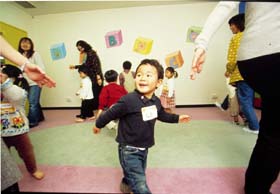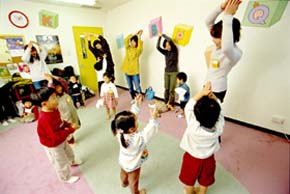|
 Not so long ago, getting fresh information on faraway countries was tough to do. But nowadays, with a click of a mouse people can leap--across borders between countries, and even over oceans--to get the news and communicate with people from anywhere in the world. It's exciting that the world has become smaller in this way, but talking to people far away often means talking in a foreign language. Not so long ago, getting fresh information on faraway countries was tough to do. But nowadays, with a click of a mouse people can leap--across borders between countries, and even over oceans--to get the news and communicate with people from anywhere in the world. It's exciting that the world has become smaller in this way, but talking to people far away often means talking in a foreign language.
In Japan, people are realizing that speaking foreign languages, especially English, will be even more important as the Internet grows. Moves are now afoot to start learning English from an earlier age. Until now, most students have started studying the language in middle school.
With all of this going on, it's no surprise that English classes for youngsters are booming these days. For some years now, middle and high schools have tried to give students more conversation practice by inviting native English speakers to help teach classes. And recently, many elementary schools have started offering after-school courses for younger students--not just grade-schoolers, but even children in preschool.
These classes aren't the same as traditional school lessons that focus on grammar rules. Students learn their English in fun ways, picking up simple phrases while they enjoy music. This helps the kids to master tough pronunciations and rhythms that don't exist in Japanese. With this emphasis on rhythm and music as a teaching tool, it's no surprise that lots of these classes are offered at music schools.
"The kids are here to have fun, not just to study," says one teacher at a Yamaha music school. "They rely on their ears rather than on reading textbooks. They learn to think in English, instead of trying to translate everything into Japanese. There's no grammar in the lessons, and there aren't any test scores to worry about." The kids in his class definitely look like they're enjoying themselves.
Students at another school learn English by using all their senses. When they walk into the room, they are peppered with questions in English: "What's your name? How old are you?" They go on to practice their numbers, counting aloud as they toss a ball back and forth. They play games like "telephone" that make them use their memory. Everything in the class is done in English.
 Kids are responding well to these teaching styles. One student is already putting her English to good use--she moved to a foreign country where it is the main language. She says: "I thought it would be tough to live in a new environment, but it's been so easy. I don't feel out of place at all." Another student, who has been studying a little each day ever since the third grade, has big plans for the future: "I'm studying so I can put my English to work one day. I'm glad I got the chance to study English. It's always good to have choices!" Kids are responding well to these teaching styles. One student is already putting her English to good use--she moved to a foreign country where it is the main language. She says: "I thought it would be tough to live in a new environment, but it's been so easy. I don't feel out of place at all." Another student, who has been studying a little each day ever since the third grade, has big plans for the future: "I'm studying so I can put my English to work one day. I'm glad I got the chance to study English. It's always good to have choices!"
Being exposed to English in a fun learning atmosphere could make today's Japanese kids--the next generation of adults--much more confident on the international stage.
Photos: (top) Students march to the rhythm of English; (above) Students dance to an English melody. (Yamaha English School)
|

